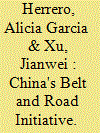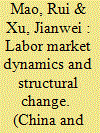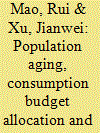| Srl | Item |
| 1 |
ID:
156446


|
|
|
|
|
| Summary/Abstract |
The Belt and Road Initiative (BRI) aims to improve cross-border infrastructure to reduce transportation costs across a massive geographical area between China and Europe. We estimate how much trade might be created among Belt and Road (B&R) countries as a consequence of the reduction in transportation costs (both railway and maritime) and find that European Union countries, especially landlocked countries, will benefit considerably. This is also true for Eastern Europe and Central Asia and, to a lesser extent, South-East Asia. In contrast, if China were to seek to establish a free trade area within the B&R region, EU member states would benefit less, while Asia would infrastructure, is advantageous for Europe as far as trade creation is concerned.
|
|
|
|
|
|
|
|
|
|
|
|
|
|
|
|
| 2 |
ID:
140234


|
|
|
|
|
| Summary/Abstract |
Structural change theories usually assume agents are homogeneous. However, because of demand-side or supply-side heterogeneities, the probability of switching among sectors differs across people. This paper reveals these differences through restoring a long-period, individual-level panel dataset from China's Urban Household Survey for 1986–2009. We find that both for people who started working for the first time and those who switched jobs, the sector choice depends on personal characteristics. In particular, women and people with higher educational attainment or a previous white-collar job are more likely to join the tertiary sector and less likely to join the primary sector. These effects are substantial even if the macroeconomic variables used in conventional structural change theories are controlled. They are also robust in various periods and at more detailed industry levels. Our research suggests that it is important to pay greater attention to the labor composition when making policy related to economic structural change.
|
|
|
|
|
|
|
|
|
|
|
|
|
|
|
|
| 3 |
ID:
134852


|
|
|
|
|
| Summary/Abstract |
This paper assesses the heterogeneous effects of population aging on personal budget allocation across sectors. Using China's household survey data, we break down each household expenditure component into its constituent members. We find consistent and robust age profiles of the composition of personal consumption expenditures. Young people spend larger proportions of their budget on food and education, culture, and recreation services. The middle-aged spend significantly more on clothing and transportation and communication. Lastly, the elderly spend substantially more on food and health care and medical services. After controlling for period and cohort effects as well as other socio-economic factors, we still find age to be a fundamental driver of consumption budget allocation. We also incorporate the estimated results into the population forecast data and predict the evolution of China's consumption budget allocation patterns driven by demographic change.
|
|
|
|
|
|
|
|
|
|
|
|
|
|
|
|